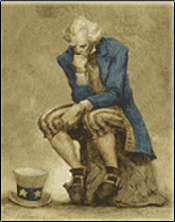
–>
June 8, 2023
We all know that with power comes the temptation to treat others as we would not like others to treat us. In other words, with power comes the temptation for corruption of all sorts. This may be as minor as treating others rudely or as major as recent reports about the Biden family corruption imply.
‘); googletag.cmd.push(function () { googletag.display(‘div-gpt-ad-1609268089992-0’); }); document.write(”); googletag.cmd.push(function() { googletag.pubads().addEventListener(‘slotRenderEnded’, function(event) { if (event.slot.getSlotElementId() == “div-hre-Americanthinker—New-3028”) { googletag.display(“div-hre-Americanthinker—New-3028”); } }); }); }
As I conducted research for this article, I found that the overwhelming majority of anti-corruption information focused on foreign corruption of one sort or another. Debate continues about whether the bribes companies pay to foreign governments to operate in their countries are economically good or bad. The most recent thinking appears to be that it is harmful. The World Bank and other well-known institutions have all sorts of high-level guidance for eliminating corruption, but I found it difficult to find much on eliminating corruption focused on our own federal government.
When I was a younger man working counter-narcotics in Colombia and other Latin American countries, I encountered corruption daily. During one of my missions, I assessed whether US aid actually reached the military and police units I worked with. I found myself counting the pairs of newer boots the local forces wore (and other equipment like trucks) to determine if the resources were properly used. It was not unheard of for officers to sell such equipment to the highest bidder…including local guerrillas and cartels. On occasion, officers gave me places to sleep and eat and then offered me “receipts” from local hotels for reimbursement upon my return stateside. They knew exactly how our travel finances worked.
I can assure you that I never took advantage of such offers. I believed I was setting an example and, by doing so, I met a few officers who did not give in to corruption either. Believe me, they had plenty of opportunities. These men ranked from Lieutenants to Colonels, and they were good men who risked their lives for countries where this type of corruption was more or less endemic. What made them different?
‘); googletag.cmd.push(function () { googletag.display(‘div-gpt-ad-1609270365559-0’); }); document.write(”); googletag.cmd.push(function() { googletag.pubads().addEventListener(‘slotRenderEnded’, function(event) { if (event.slot.getSlotElementId() == “div-hre-Americanthinker—New-3035”) { googletag.display(“div-hre-Americanthinker—New-3035”); } }); }); }
In my experience, they were simply moral men who believed in serving something greater than themselves. They understood right from wrong and wanted better lives for their communities and not just themselves. It is astonishingly simple to understand.

Image: Money under the table by rawpixel.com.
An important point here is that they did not tolerate corruption around them. Their subordinates and colleagues felt peer pressure to limit their personal corruption and, if they were corrupt, they tried to hide it. They knew others saw their activities and would hold them accountable.
We need to reinforce this accountability and apply it to our own governments, but how? We have traditionally relied upon the Fourth Estate—that is, the news media—to expose wrongdoing and corruption. Unfortunately, that source is no longer as reliable as it once was (even with the biases it always had).
The saying goes that all politics is local, so that implies that all corruption is local too. Consider that our government is of the people and for the people. If that is true, then change in our government must come from the ground up and not the other way around. It must come from the people.
California recently enacted the “anti-pay to play” law holding that “…local elected officials can’t vote on matters that have a direct financial effect on interests that have contributed $250 or more to the official’s campaign in the previous year. It also blocked local officials from accepting such a contribution for a year after the vote.”
Is this going to be perfect? Probably not, but it is a step in the right direction. One thing is certain, however: stakeholders will find new ways to game the system to their personal benefit. As a result, as new corruption schemes develop, we must create new ways to counter them. It is an ongoing and constant fight for empowered and protected apolitical audit/inspection organizations.
‘); googletag.cmd.push(function () { googletag.display(‘div-gpt-ad-1609268078422-0’); }); document.write(”); googletag.cmd.push(function() { googletag.pubads().addEventListener(‘slotRenderEnded’, function(event) { if (event.slot.getSlotElementId() == “div-hre-Americanthinker—New-3027”) { googletag.display(“div-hre-Americanthinker—New-3027”); } }); }); } if (publir_show_ads) { document.write(“
To police local politicians, people can implement an Ethics Commission, hire a part-time or full-time Ethics Officer, and work with other cities and counties to share resources and possibly even audit each other. We can also create an Inspector General and/or expand the duties of a City/County Auditor to include local government investigations.
Most importantly, all these efforts require unbiased citizen oversight committees—perhaps selected in the same manner as a grand jury to ensure objectivity. They should serve on a part-time basis for a period of time. Given the current bias and unreliability of the mainstream media (MSM), a state-level citizen oversight committee can keep an eye on what our elected State and U.S. Representatives are up to.
These committees can provide concise periodic reports to the public that do not require the average citizen to sift through the various media outlets that are in such conflict with each other today. They would consist of straight facts on decisions made, voting records, sources of income, personal behavior, and other important factors. Reports like these are much easier to access and interpret for the average busy, discouraged, and/or politically apathetic citizen.
These committees might even draw citizens away from the MSM sources and prompt the owners of these outlets to drive better and more unbiased investigation and reporting. We need some mechanism besides financial gain to get the MSM doing its job as we need it done.
There are other things we can do, such as teaching our children sound ethics, proper debating skills, and the Judeo-Christian principles on which the Founders based their thinking, but those are the subjects of other articles.
In the end, increased local participation in our governance is the only way to counter the corruption and bureaucracy we endure today. We need more unelected citizens involved and paying attention to what the government is doing. Work like this is the duty of citizens whether they want to do it or not. We require citizens as jurors, and we draft young men to go to war. Imagine the reduced need for as many juries and wars if more citizens were involved in government oversight and our government improved how it dealt with the issues of the day.
<!–
–>
<!– if(page_width_onload <= 479) { document.write("
“); googletag.cmd.push(function() { googletag.display(‘div-gpt-ad-1345489840937-4’); }); } –> If you experience technical problems, please write to [email protected]
FOLLOW US ON
<!–
–>
<!– _qoptions={ qacct:”p-9bKF-NgTuSFM6″ }; ![]() –> <!—-> <!– var addthis_share = { email_template: “new_template” } –>
–> <!—-> <!– var addthis_share = { email_template: “new_template” } –>




